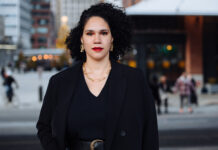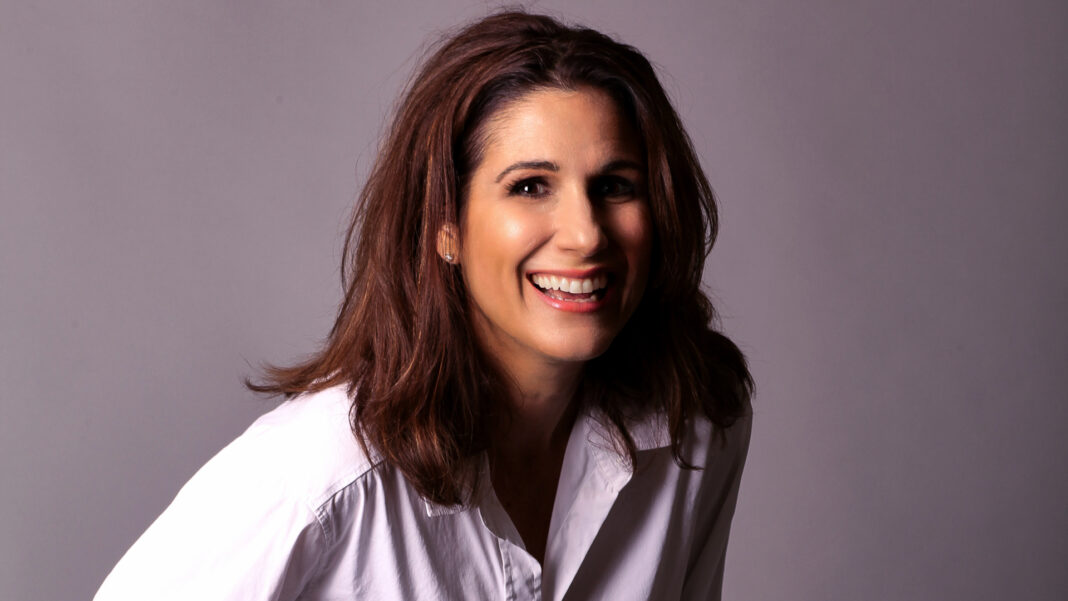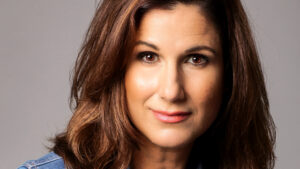
THIS IS THE THIRD OF OUR BEST OF 23 REVIEW OF INTERVIEWS: On April 19th of this year I spoke with Tony Award-winner Stephanie J. Block about her upcoming show with Seth Rudetsky at The Wallis. She was on tour at that time with Into the Woods. But the show with Rudetsky was postponed. It has since been rescheduled for this Sunday at The Wallis. Instead of just one show there are now two.
I held the interview you are about to read until closer to the rescheduled shows. Which means some of the conversation we had is less timely now that it was in April. Discussions of Into the Woods, Funny Girl and her performance as Norman Desmond in Sunset Boulevard at the Kennedy Center aren’t as topical today as they were then.
But Block is not just a great performer – as her roles in Falsettos, The Boy From Oz and The Cher Show (for which she won her Tony Award) can attest – she’s also a great interview. So though slightly dated, this is one thoroughly entertaining conversation. What follows are excerpts from that interview that have been edited for length and clarity. I strongly encourage you to go to our YouTube channel to see the full interview.
You’ve sung on stage with Cher, you sung with Dolly Parton, and of course, you have your Tony Award. When you were tackling the very intense roles of Fifer, Belle, Ariel and Mary Poppins at Disneyland, is this what you imagined your career would be?
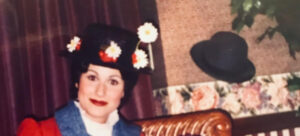
First of all, damn you! Secondly, as the story has it and it is true, my mother forged my birth certificate so that I could audition for the Disneyland Summer Parade. I wasn’t yet 16, so she had to forge my birth certificate. So that already tells you enough of what you need to know about the loving show mother that embraced me and encouraged me. But I was serious even back then.
I went to the Orange County, which was the High School of Performing Arts back then, and everything had that high level of stakes and intensity and discipline. So whether I was Fifer the Pig dancing down the parade route at Disneyland, I took as much pride in that as I did with doing Stephen Sondheim’s Into the Woods.
You were referred to at your church as the little Ethel Merman when you were seven years old. You have since had the opportunity to play Reno Sweeney in Anything Goes, which is a role that Ethel Merman originated. Are there other Ethel Merman roles that you would like to do?
I think with a lot of the classic musical theater pieces there might have to be some reworking. Would I love to play Annie Get Your Gun? Absolutely. I’d love to play Annie. But I think someone like Larissa FastHorse might have to go in there and change a lot of the lines in the material. But does the music still hold up? Yes. Does the sort of crackle in her performance and the indelible performance that she’s left for us still hold true in my heart? Yes. Because in my heart, I’m an old MGM girl. You put on one of those old movies – anything with Judy Garland, anything with Ann Miller – and it just changes the whole course of my day.
I saw you in Falsettos, and frankly, I think you were robbed for the Tony Award because that performance, that whole show, was one I will never forget. I saw 9 to 5 in Los Angeles. I saw The Boy from Oz and I recently saw Into the Woods before it closed in New York. And the first time I saw you was in Crazy for You at La Mirada.
Oh, my gosh.
Those shows, absent Crazy for You, are a mix of huge successes and less successful shows. Something Hal Prince said that I thought was really interesting was how much he learned more from the shows that weren’t successful than the ones that were. Is there a difference between the lessons you’ve learned on shows that were successful versus the ones that were not?
I think we just have to say that 75% of most Broadway endeavors would be defined as quote unquote, failures. So right off the bat, three quarters of every show that gets mounted is not going to last [long enough to] get their money back. I can’t speak to the producer end of it. I can only speak to the actor end of it. Yeah, I do learn a lot about myself when things don’t go as I hoped, prayed or wished. I will say I always enter a piece 150% because I think you have to love the project with that much in order to dive in.
When it starts falling apart, I’m also very much aware of that. I like to drink the Kool-Aid, but, all of the flags start going up. Or you go, Oh, this may not be going to Radio City to collect all the Tonys. But somehow I look at these artists that always start from scratch, begin again, are willing to put their vulnerable selves on the line for show after show after show. That, to me, is the biggest statement of most artists I know. That we really are willing to accept three quarters of it as failure and a small one quarter as success, and we keep jumping in headfirst.
Your performance in Falsettos of I’m Breaking Down, strikes me as a three-act play in 4 minutes and 48 seconds. What was the process of creating the ever increasingly intense breakdown over the course of that song?
You’re exactly right. You’ve got to have a beginning, a middle and an end. I find it so interesting that [composer/bookwriter] William Finn wrote essentially an 11:00 number in the first half hour of the play. That, in and of itself, is so out of form that it’s kind of wild. [Director/bookwriter] James Lapine said, I’m going to give you your space. I’m going to give you a couple days by yourself with our choreographer. I’m going to give you a whole host of props that you would find in your kitchen. I’m going to let you play and then I’m going to come in to see what you have created. For James, it’s very much simplicity defines mastery. Believe it or not, that epic song had more crap and props and movement to it than what you saw in its final version on Broadway. But I approached him and he said, How do you see this song? And I said, I think I see this song is like Carol Burnett having her own culinary show. And he goes, okay, well show me what you got.
This is Carol Burnett-slash-Trina trying to put on a very composed culinary show. Little by little, her inner voice, all of her demons, just start taking over. I actually went too far and he had to bring me back. Now we’ve got to find the balance between humor, angst and a conversation with the audience. So that was the balancing act.
Carol Burnett has to be a huge influence for you. While you were doing Sunset Boulevard you posted on your Instagram account a picture of Gloria Swanson side by side with Carol Burnett and said that your performance was going to be a combination of the two. How important is Carol Burnett in your life?
She’s wildly important to me. She, to me, being able to stand up as her and have a conversation with her audience to break that fourth wall and to be secure enough to say this is who I am as Carol, let’s banter and talk, then to embody a character in some of the most dramatic things I’ve ever seen. Then to embody humor and to not be so serious about herself that she could absolutely make fun of herself in the middle of a full skit. She’s a genius. I knew that if I could even do a fraction, if I could do one quarter of what Carol Burnett was doing, then there was a place for me in this world.
Regarding Into the Woods, you said that was a dream role, 30 years in the making. What inspires you most about this show in general and more specifically about the role of the Baker’s wife?
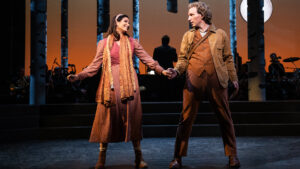
In the beginning of my career I wanted to wear characters as like a costume and take on their shape, their form, their sound. Now as I get older, the goal is to bring myself to a character. To bring my story, my shape, my sound to these characters. The Baker’s wife is very much that. I am playing opposite my husband [Sebastian Arcelus]. So the baker and the baker’s wife couldn’t be more true than I feel is being portrayed now. My husband and I had quite a journey to get a child. It took us well over five years. As you can imagine, from Chinese herbs to shots to geriatric pregnancies, all of the above. When we tell that story, we are them and they are us.
The themes that are interwoven in this piece: it doesn’t matter if you’re in high school or you’re 80 years old or you’re a middle-aged woman, or you have a child, don’t have a child. Everybody’s journey personifies a different stage in someone’s life, and that’s what you’re going to hear. That’s what the audience is going to be attuned to. So right now, my journey as the baker’s wife and having a child is far different than me wanting to play the baker’s wife, like you said, 30 years ago.
You met Sebastian when you were in Wicked together. You got married before a performance, I think it was six years ago, and then you just went on stage. What do you remember most about that performance, particularly when you were singing As Long As You’re Mine?
Any time a couple, regardless of what stage it is in your relationship, when there’s a secret that just two of you hold, there is that sort of butterflies in the belly. There is sort of the giggle and the unspoken. We know something that nobody else knows. So that excitement certainly carried through. I’m sure we had smiles. [Elphaba] isn’t supposed to smile through the whole show, but internally I’m sure I had an extra sparkle in my eye and a smile that was underneath that green make-up when we did As Long As You’re Mine. It was a defining moment, certainly in my career, because all of those words took on a completely different meaning as husband and wife.
I saw one of the interviews that you did around The Boy From Oz and you said you weren’t doing the Liza Minnelli that we all know and love. This is Liza who was 18. It was before her fame had come to her. If 30 or 40 years from now, somebody wants to do a musical about somebody with whom you collaborated and an actor was going to take on the role of the young Stephanie J. Block, how would you like that character to be portrayed?
I would like her to be hopeful. I would like her to be silly. I would like her to be brassy because I was big and brassy. And I think always kind. Always kind, but ready to play. Those would be the words that I would infuse into the actress. It would be, I think, much like Liza, very difficult to watch that portrayal. Especially if somebody was to play young me but span 35 years of me in 45 minutes. I would feel like there’s a lump in my throat going, Oh, but there’s more. Oh, but you forgot to add that. But I think I would also have an open heart and the grace to accept it and receive it and hopefully lovingly support it.
In a 2006 interview you did with BroadwayWorld, you called the role of Fanny Brice in Funny Girl your “favorite regional theater role.” You went on to say, “It’s time to bring her back to Broadway. What a powerhouse role for any actresses. Producers interested can call 555-Stef!” which I thought was terrific. Fanny is back on Broadway now in a production that has had more rollercoasters than Disneyland. What does this production tell you about the challenges of producing contemporary musical theater and the pitfalls that have to be avoided?
If I’m going to answer this, my disclaimer is I am taking great liberties because I have no horse in the race as a producer. But what I would like to see happen is that we cast a part based on the merit and the truth and the marriage of an actor and a piece not based on what could possibly sell tickets because of the pedigree of one particular person or one particular thing. It is a collaboration and a marriage and they all have to meet up.
I think we also have to entertain the idea of thinking outside the box. Then step into rehearsal. And then if it doesn’t go as planned, that there is the open-heartedness and the grace that I just spoke about to say, okay, great. You are monstrously talented. Perhaps this is not the vehicle that we all thought it was going to be for you, and that’s not going to service you or the piece. Let’s rethink. How do you feel about that? Let’s re-engage the conversation.
Much like art, live theater, is a living, breathing thing that I wish the creation of a piece can continue to be that without looking at the bottom line. That something is being created for artistry’s sake, and that within that landscape or ecosystem, things change or mistakes were made or gosh, this isn’t working out the way we hoped, or my God, this is working out even better than we hoped, right? But that the conversation can still happen and that grace can surround that. That’s what I feel.
Reviews and audience response to the Kennedy Center production of Sunset Boulevard means you’re giving us all optimism that there might be a Broadway revival. Do you have any new ways to dream, shall we say, about a Broadway production in which you play Norma Desmond?
I have 25% chance, maybe 50% chance, that there will be new ways to dream. The timing is not the timing I would like. There is a project that is in the works for cinema for Sunset Boulevard. That is ALW’s [Andrew Lloyd Webber] focus. That’s The Really Useful Group’s focus. And I can understand that as a business woman. As the artist, I would have loved to have seen a momentum and a transfer.
When I was asked by [Broadway Center Stage] Artistic Director, Jeffrey Finn of the Kennedy Center, what would you like to do in the next year, and I came out with this, I had no idea that this part and I would embrace each other in such a way that it affected me. It affected the audience. It affected the whole piece to be looked at in a completely different way. That was not my goal. But that was one of those times where we were all jumping in headfirst with no expectations, just wanting to create something different. Timely. I am of the school now that if you are going to revive, there needs to be a why. So we shall see what the next couple of years might bring. I’d like to hope that there’s space for it back on Broadway. We’ll see.
There was a Tony Monday last year or the year prior where you posted a video saying to your friends who were or were not nominated, that regardless of that the story continues to be told. What’s the story that’s most important for you to tell through your work today and through these evenings you have with Seth Rudetsky?
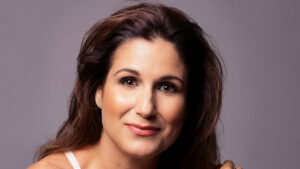
For me, right now, the word that is screaming in my head is connection. Absolute connection. If you are putting something out there and it is not being received and then digested and something is being thrown back at you, that’s my ultimate goal. Whether I am playing a part, whether I’m myself, whether I’m beside ridiculous, monstrously talented and smart Seth Rudetsky, for me, the evening was not a win if I did not connect and communicate with my audience. So that’s always the goal.
I certainly think we’ll do that at The Wallis. These intimate nights and spaces, they’re a joy to me. They really fill up my artistic bank. And much like Carol Burnett, it does feel like I’m standing there in my own skin wanting to meet them and wanting them to meet the real me.
To see the full interview with Stephanie J. Block, please go here.
Main Photo: Stephanie J. Block (Courtesy The Wallis)


